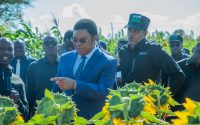Agriculture in Tanzania: Addressing Soil Acidity through Education and Innovation
By Brenda Ngatara
To promote sustainable agriculture in Tanzania, the Southern Agricultural Growth Corridor of Tanzania (SAGCOT) Centre and the Tanzania Agricultural Research Institute (TARI) launched a series of educational workshops in April targeting the persistent issue of soil acidity.
These workshops took place in the Geita and Songwe regions, spanning from April 16th to 24th, 2024, and focused on empowering local extension officers and agro-dealers with the skills and knowledge necessary to support farmers in adopting more sustainable farming practices.
The initiative came in response to the critical challenges posed by soil acidity in the Mbozi district, a crucial area for producing staple crops such as maize and beans. Comprehensive research in 2023, including ‘shotgun trials’, revealed that applying agricultural lime could significantly improve soil conditions and crop yields. These results underscored the need for widespread educational efforts and practical interventions to mitigate soil acidity.
According to Dr Sibaway Mwango, National Coordinator for Agricultural Natural Resources Management (TARI-Mlingano), research indicates the appropriate locations for applying lime and withholding it, the suitable fertilizers for specific areas, and those unsuitable for certain regions. “We have conducted training programs in the Geita and Mbozi districts involving field and extension officers. This was prompted by the challenge of motivating farmers, who have been encouraged by the positive outcomes of these trials. For instance, in the Geita district, many farmers were enthusiastic and requested lime, with over 140 registering and submitting their names for distribution. Notably, lime is entirely unavailable in the Geita district through agro-dealers. Consequently, during these training sessions, involving input suppliers to expose them to this lime distribution opportunity was crucial, ensuring its accessibility to farmers. Apart from agro-dealers, Tanzania has numerous agricultural lime sources, and we encouraged investors to explore investment opportunities in this sector to make lime readily available to farmers.”
These training sessions are essential, and we have discovered that many field officers previously lacked adequate knowledge. However, he noted they have gained valuable insights to train farmers on proper lime application techniques and overall soil health management practices.
Each three-day workshop was designed to be a hands-on experience, engaging more than 35 local extension officers and agro-dealers from various wards. The training sessions, Training of Trainers (ToTs), covered various topics, including applying lime, understanding soil health indicators, and adopting integrated soil fertility management practices. The goal was to equip participants with the tools to educate and support farmers in transforming their agricultural practices, thereby enhancing productivity and sustainability.
The broader implications of these workshops are significant for the future of agriculture in Tanzania. The region relies heavily on agriculture for food security and economic stability. Improving soil health through sustainable practices is essential for ensuring the long-term viability of farming and safeguarding the livelihoods of countless farmers and their families.
In the coming months, the focus will be on continuing the dialogue around soil health and sustainable farming practices. This includes addressing common questions about using lime and other soil amendments as stakeholders, including the Ministry of Agriculture, TARI, and the SAGCOT Centre, work together to disseminate crucial information and foster community engagement.
For local farmers, the knowledge and practices shared during these workshops represent a critical step towards combating soil acidity and driving forward the region’s agricultural prosperity. Applying the strategies discussed can enhance soil fertility, boost crop production, and transition towards more sustainable farming methods.
The collaborative efforts of government agencies, research institutions, and the agricultural community are pivotal in translating the insights from these workshops into effective action on the ground. This collective endeavour is crucial for ensuring that the advancements in agrarian knowledge lead to real and lasting benefits for Tanzania’s agricultural sector.
Stakeholders and interested parties are encouraged to visit the provided online links for further details on the workshops and access to additional resources, including educational videos and project overviews.
This initiative marks a proactive step towards addressing environmental and agricultural challenges through education and community involvement. It highlights the potential for innovative solutions to foster a more sustainable and prosperous future for agriculture in Tanzania.
To tackle acidic soil, a significant challenge in Tanzania, the shotgun trials and the subsequent training sessions in Geita and Songwe were crucial for implementing the Guiding Acid Soil Management Investment in Africa (GAIA) initiative. Funded by the Bill & Melinda Gates Foundation (BMGF) and led by CIMMYT Harare, the project was implemented in Tanzania by several organizations, including TARI Mlingano, TARI Uyole, TARI Ukiriguru, and the SAGCOT Centre.

